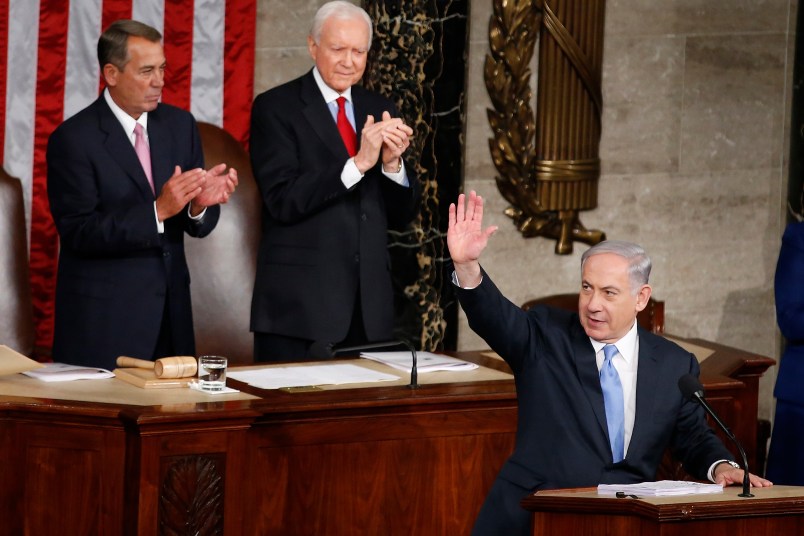For nearly an hour today, Israeli Prime Minister Benjamin Netanyahu presented his concerns about a nuclear deal with Iran. But the country portrayed by Netanyahu resembled a comic-book villain more than a nation engaged in intense nuclear negotiations with the P5+1, and in efforts to push back ISIL’s advances in Iraq.
While rejecting the developing nuclear deal and urging Congress to push for a “better deal,” Netanyahu provided scant details about how a “better deal” might be reached with a country he compared to “clutching Israel with three tentacles of terror,” a “deadly game of thrones,” the “Persian potentate” and holding a “voracious appetite for aggression.”
This isn’t the first time Netanyahu has lobbied Congress with dire warnings of security threats in the Middle East.
In 1995, Netanyahu wrote that Iran would have a nuclear weapon in “three to five years,” and, in 1996, speaking before a joint session of Congress, he warned that the deadline for Iran acquiring a nuclear weapon was “getting extremely close.”
Those predictions, while terrifying, were also inaccurate.
By the 2000s, Netanyahu had shifted his short-term focus to Iraq. Testifying before Congress in 2002, Netanyahu warned that Iraq was operating “centrifuges the size of washing machines” and asserted that there was “no question whatsoever that Saddam is seeking and working and is advancing toward the development of nuclear weapons.”
Nearly 12 years after the invasion of Iraq and more than 36,000 U.S. casualties later, the U.S. and its regional allies are engaged in an intervention against ISIL fighters in Iraq, a group which thrived in the power vacuum created in Iraq’s Sunni communities.
Nobody ever found weapons of mass destruction.
Given this history, one would think Netanyahu might be cautious to resurrect the ghosts of his past advocacy for a U.S.-led regime change agenda in the Middle East, especially at the expense of driving a large and visible (more than 50 Democrats reportedly skipped the speech) partisan wedge into the Israel-U.S. relationship.
But the partisan divide is just one of the consequences emerging from Netanyahu’s strategy of working to prevent Washington from reaching a compromise with Iran. That compromise would entail preventing Iran from acquiring a nuclear weapon while putting Iran on the path to normalized relations with the rest of the world, an outcome to which the Israeli Prime Minister appears deeply opposed.
Netanyahu’s lobbying in Washington over the past three decades centered on presenting Israel as Washington’s one true ally in a region chock full of strong men, human rights abusers and terrorist groups so savage that only a regime-change agenda could address American and Israeli security concerns.
With Syria a failed state, ISIL controlling huge swaths of territory in Iraq and Syria, and the Iraqi government unable or unwilling to fully address the secular divides within its own borders, Iranian and U.S. interests are increasingly aligned. Netanyahu probably fears that reaching a compromise over Iran’s nuclear program is only the first step in greater cooperation between Iran and the U.S. on a range of regional issues.
That cooperation would come at the expense of a decrease in Iran fear-mongering in Washington and a U.S. foreign policy which finds fewer reasons to constantly align its foreign policy priorities and national security agenda with Israel. That’s a very scary possibility for Netanyahu. But it’s a foreign policy agenda gaining popularity with a war-weary American public.
If Netanyahu is worried that the American public is turning away from his hawkish agenda, his concerns might be justified. A poll released today by the Program for Public Consultation and the Anwar Sadat Chair for Peace and Development at the University of Maryland found that 61 percent of Americans support a deal permitting limited enrichment capacity for Iran. Only 36 percent of Americans supported increasing sanctions in hopes of getting Iran to cease all uranium enrichment.
But one of the most hard-edged criticisms of Netanyahu’s lobbying against the potential nuclear deal came from House Democratic Leader Rep. Nancy Pelosi (D-CA), who attended today’s speech. In a statement, the House Minority leader said, “I was near tears throughout the prime minister’s speech—saddened by the insult to the intelligence of the United States as part of the P5+1 nations, and saddened by the condescension toward our knowledge of the threat posed by Iran and our broader commitment to preventing nuclear proliferation.”
Pelosi’s reaction may be an indicator of how the greatest lasting impact of Netanyahu’s speech will be a tearing of the fabric that makes up the bipartisan pro-Israel consensus.
Eli Clifton is a New York based journalist who focuses on money in politics and U.S. foreign policy. His work has appeared in The Intercept, The Nation, Salon, Slate, ThinkProgress, ForeignPolicy.com and InterPress Service.







This is the 26th consecutive year that Iran has been one year away from developing a nuclear weapon.
Bibi Netanyahu is once more requesting that the United States sacrifice its soldiers on behalf of Israel because the lives of Israeli soldiers are far too precious to lose. Notice how Boehner and Orin Hatch, applauding and smiling, wholeheartedly agree and think that this is just a terrific idea.
Bill O’Reilly sez he knows Iran is exactly how Bibi describes it because he nailed himself to a cross there and saw it all. just after he saved his cameraman’s life
So for at least the last 20 years Netanyahu has never been right about Iran and he was wrong about Iraq too.
Even if he was partly right it seems that this is just rhetoric to help make a deal fall through. The GOP has been against the Iran talks from the start and some Dems. For only partly valid reasons, all this does is give them a reason to base this in.
Any deal in the form of a treaty is dead before it gets done. Seems like a deal is the best way to go about this whole thing. Even if it is not perfect.